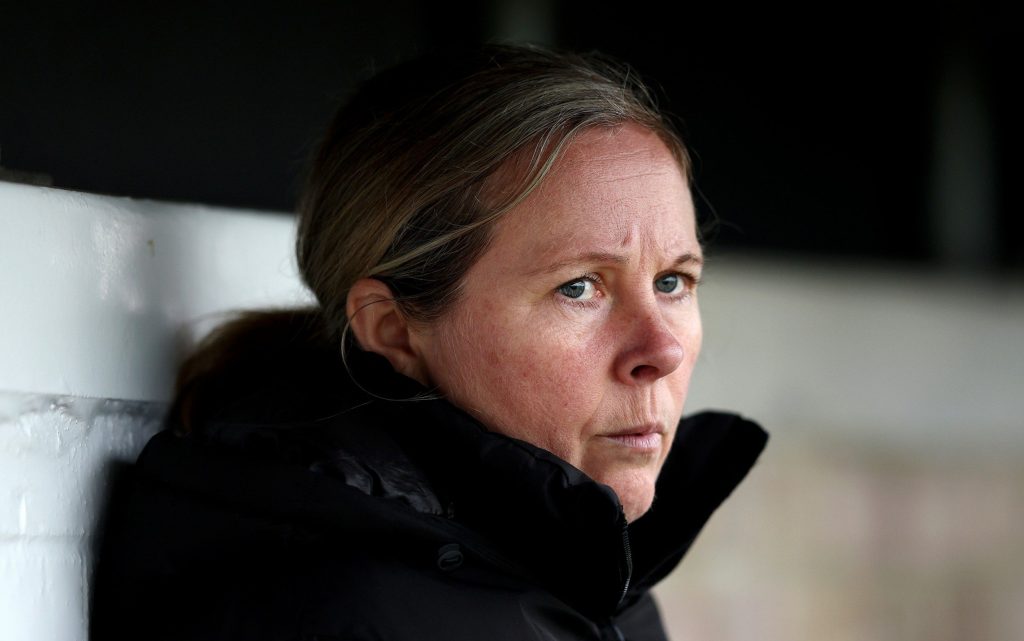
Rehanne Skinner is forthright when asked about West Ham United’s achievements this season.
“We’re definitely punching above our weight, based on resources within the league,” she says.
Skinner is speaking to Telegraph Sport after penning a one-year contract extension with the club. Her side sit seventh in the Women’s Super League but could still finish fifth. She is aware that some pundits predicted that West Ham would be in a relegation battle this season. The club finished 11th last term and, while they finished nine points clear of bottom place, their three wins from 22 games indicated a testing campaign.
It has been a different story this season. The club’s form since Christmas has been excellent and Skinner’s side have taken points off Chelsea, Manchester City and Manchester United.
“The amount of investment that goes into the top-four clubs is just astronomical in comparison to everyone else. I can’t do anything about that and neither can the players in the building,” she says.
“We’ve maximised everything that we’ve had to be competitive this year. We’ve taken more steps forward this season than what we anticipated. It was always a project and I think where it’s evolved to, we’ll be in a good position to keep it moving forward in the right direction next year.
“We knew what we needed to do when I came in, that was always going to take time. It’s something that managers aren’t often afforded.”
Relegation has not been a concern for West Ham this season and there is a chance that all clubs will be safe from the threat of it in the near future. The Women’s Professional Leagues Limited (WPLL), the company which runs the WSL and Championship, is considering removing it as part of plans to revamp the women’s game.
Removing relegation is one of a number of options on the table. Telegraph Sport reported last month that the WPLL is also considering title play-offs and splitting the league in two after a certain number of games.
Skinner has been involved with the women’s game since the inaugural season of the WSL in 2011, when she was a coach at Arsenal, and believes the league should be open to every possibility.

“I do think there’s a cultural piece in the UK about the traditions of how football should look but I don’t think that’s relevant if we’re trying to move forward,” she says.
“For me, change is change. A lot of people don’t like change but actually change can often be for the better, it depends on how you want to embrace it.
“If we’re going to keep increasing the fanbase, increasing the investment, I think we’re going to have to accept that we are going to need to do something different, because that’s just where the game is now.
“We’ve had a bit of a peak, then it’s plateaued a little bit and I think we’ve got to push for the next thing. If we stay still, it will run away from us. I think that’s why we’re in a place where we don’t need to be bound by what the men’s league is set up like, it’s just totally different.
“I’d be an advocate for options on the table and let’s see what we can do and even if it’s a two-year, three-year trial to see what that looks like. If it improves the game, attracts more people to the game, then I just think: why not?”
When it comes to making the league more competitive, Skinner says she would not be against replicating something in line with the NWSL play-offs in the United States.
“I think that the set-up is a good idea because it does make it even more exciting, there’s a lot more teams involved in that and you go into more knockout stages.
“I think there’s merit in that, I think it works for them and I can’t see why it wouldn’t work for us. I think it’s an opportunity to be explored. If it doesn’t work, we move forward and we change it again.
“We’re less regimented [than the men’s game] which actually gives us more freedom to think outside the box. We did the summer league, it didn’t work but it started the process. People have to be brave enough to make a change and try something different.”
‘I’ve always wanted to support female coaches’
West Ham have themselves been more competitive this season and much of that is a result of their astute transfer business. In the summer they signed German forward Shekiera Martinez from Eintracht Frankfurt. At the time, Martinez did not meet the Governing Body Endorsement criteria for international player visas, so returned to Germany to join SC Freiburg on loan in order to accumulate the necessary points.
Martinez returned to West Ham in January and has scored nine goals in 10 games. With two matches left, she is only three goals adrift in the race for the WSL golden boot.
“I’ve watched Shekiera for years because she played against us for Germany when I was with England, I’ve seen her over many years,” says Skinner. “She fitted everything that we were looking for from a No 9 and has come in and hit the ground running and got player of the month in March, which is the first time in West Ham’s history that we’ve had a player in that position.
“Sometimes if you’re in a position to play the long game, for the right people, it’s well worth it.”
Skinner is the longest-serving female manager in the WSL and credits former England manager Hope Powell and coaches Mo Marley and Brent Hills for taking a chance on her early in her career.
While Skinner does not class herself as a role model, she is aware that her presence on the touchline can serve as inspiration for aspiring female coaches.
“I’ve always wanted to support female coaches in the game. Where possible, they’ve been in my staff and if not I’ve been mentoring people behind the scenes to try to help those coaches move to the right level within the game.”
Skinner is certainly a fine example to the next generation of coaches on how to get the best out of a team and defy expectations.

Rehanne Skinner is forthright when asked about West Ham United’s achievements this season.
“We’re definitely punching above our weight, based on resources within the league,” she says.
Skinner is speaking to Telegraph Sport after penning a one-year contract extension with the club. Her side sit seventh in the Women’s Super League but could still finish fifth. She is aware that some pundits predicted that West Ham would be in a relegation battle this season. The club finished 11th last term and, while they finished nine points clear of bottom place, their three wins from 22 games indicated a testing campaign.
It has been a different story this season. The club’s form since Christmas has been excellent and Skinner’s side have taken points off Chelsea, Manchester City and Manchester United.
“The amount of investment that goes into the top-four clubs is just astronomical in comparison to everyone else. I can’t do anything about that and neither can the players in the building,” she says.
“We’ve maximised everything that we’ve had to be competitive this year. We’ve taken more steps forward this season than what we anticipated. It was always a project and I think where it’s evolved to, we’ll be in a good position to keep it moving forward in the right direction next year.
“We knew what we needed to do when I came in, that was always going to take time. It’s something that managers aren’t often afforded.”
Relegation has not been a concern for West Ham this season and there is a chance that all clubs will be safe from the threat of it in the near future. The Women’s Professional Leagues Limited (WPLL), the company which runs the WSL and Championship, is considering removing it as part of plans to revamp the women’s game.
Removing relegation is one of a number of options on the table. Telegraph Sport reported last month that the WPLL is also considering title play-offs and splitting the league in two after a certain number of games.
Skinner has been involved with the women’s game since the inaugural season of the WSL in 2011, when she was a coach at Arsenal, and believes the league should be open to every possibility.

“I do think there’s a cultural piece in the UK about the traditions of how football should look but I don’t think that’s relevant if we’re trying to move forward,” she says.
“For me, change is change. A lot of people don’t like change but actually change can often be for the better, it depends on how you want to embrace it.
“If we’re going to keep increasing the fanbase, increasing the investment, I think we’re going to have to accept that we are going to need to do something different, because that’s just where the game is now.
“We’ve had a bit of a peak, then it’s plateaued a little bit and I think we’ve got to push for the next thing. If we stay still, it will run away from us. I think that’s why we’re in a place where we don’t need to be bound by what the men’s league is set up like, it’s just totally different.
“I’d be an advocate for options on the table and let’s see what we can do and even if it’s a two-year, three-year trial to see what that looks like. If it improves the game, attracts more people to the game, then I just think: why not?”
When it comes to making the league more competitive, Skinner says she would not be against replicating something in line with the NWSL play-offs in the United States.
“I think that the set-up is a good idea because it does make it even more exciting, there’s a lot more teams involved in that and you go into more knockout stages.
“I think there’s merit in that, I think it works for them and I can’t see why it wouldn’t work for us. I think it’s an opportunity to be explored. If it doesn’t work, we move forward and we change it again.
“We’re less regimented [than the men’s game] which actually gives us more freedom to think outside the box. We did the summer league, it didn’t work but it started the process. People have to be brave enough to make a change and try something different.”
‘I’ve always wanted to support female coaches’
West Ham have themselves been more competitive this season and much of that is a result of their astute transfer business. In the summer they signed German forward Shekiera Martinez from Eintracht Frankfurt. At the time, Martinez did not meet the Governing Body Endorsement criteria for international player visas, so returned to Germany to join SC Freiburg on loan in order to accumulate the necessary points.
Martinez returned to West Ham in January and has scored nine goals in 10 games. With two matches left, she is only three goals adrift in the race for the WSL golden boot.
“I’ve watched Shekiera for years because she played against us for Germany when I was with England, I’ve seen her over many years,” says Skinner. “She fitted everything that we were looking for from a No 9 and has come in and hit the ground running and got player of the month in March, which is the first time in West Ham’s history that we’ve had a player in that position.
“Sometimes if you’re in a position to play the long game, for the right people, it’s well worth it.”
Skinner is the longest-serving female manager in the WSL and credits former England manager Hope Powell and coaches Mo Marley and Brent Hills for taking a chance on her early in her career.
While Skinner does not class herself as a role model, she is aware that her presence on the touchline can serve as inspiration for aspiring female coaches.
“I’ve always wanted to support female coaches in the game. Where possible, they’ve been in my staff and if not I’ve been mentoring people behind the scenes to try to help those coaches move to the right level within the game.”
Skinner is certainly a fine example to the next generation of coaches on how to get the best out of a team and defy expectations.





